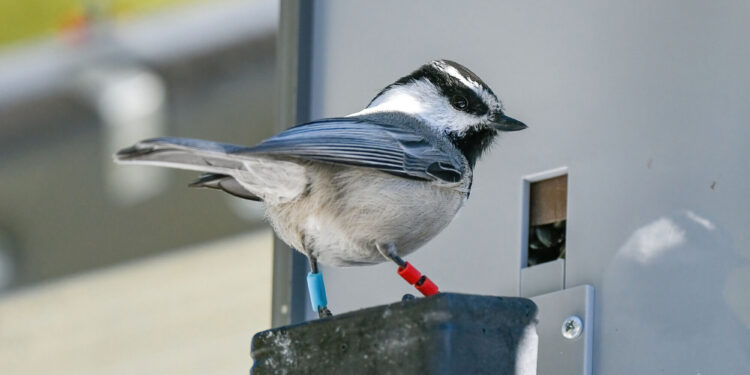A tagged black-capped chickadee arrives at a feeder waiting for its seeds. Credit: Carrie Branch
While there’s no denying that “survival of the fittest” still reigns supreme in the animal kingdom, a new study shows that being the smartest — or at least the smartest — is also very important.
Carrie Branch, an animal behavior and Western cognition researcher, and her collaborators at the University of Oklahoma and the University of Nevada, Reno, tracked the spatial cognition and lifespan of 227 mountain chickadees for more than a decade. They found that birds with better spatial learning and memory skills (when it came to understanding their environment and strategies for storing or caching food) lived longer.
The study, published September 5 in the journal Scienceconfirms that enhanced cognitive abilities may be associated with longer lifespan in wild tits.
“Animals have two interests. They want to survive and they want to reproduce. The smartest thing for them to do is to do whatever allows both of those things to happen. We found that for mountain chickadees, that means knowing where to find food, storing it successfully, and remembering where they stored it so they can retrieve it later,” said Branch, a psychology professor and senior research scientist at Western University’s Advanced Avian Research Centre.
Cognitive abilities have long been considered a key indicator of animal survival and lifespan, but field experiments and tests often rely on indirect measures of mental abilities, such as brain size. Chickadees are relatively small birds and, as a result, have small brains. Despite this apparently physical limitation, mountain chickadees performed excellently in the series of experiments that Branch and his collaborators designed for them at a remote field site in the Sierra Nevada Mountains.
“I think the specialized cognitive abilities of chickadees are a product of their social dominance structure, but we’re still testing this theory. So far, we can confirm that chickadees have figured out how to hide and retrieve food using spatial cognition, and those that do it best live longer,” Branch said.
Chickadees are native to North America, where they are very common. A chickadee can hide up to 80,000 individual seeds, which it collects during the winter.
Living longer also means having more offspring
Branch and his colleagues tested the cognitive abilities of mountain chickadees using radio-frequency feeders, spatially organized in groups of eight and equipped with motorized doors that opened automatically for electronically marked birds, offering them a food reward when they landed on the perch.
With more than a decade of data collected, the new study shows that chickadees with the best spatial cognition will live, on average, two years longer than those with the worst spatial cognition. Chickadees breed once a year, with an average clutch size of seven eggs, and chicks with the best spatial cognition can produce more than double the number of offspring (14 more offspring) than those with the worst spatial cognition. In previous studies, Branch and colleagues reported that females produced more offspring when paired with “smarter” males.
“This study shows that mountain chickadees with better spatial cognitive abilities are more likely to live longer because these abilities allow them to successfully retrieve hidden food while coping with challenging and unpredictable environments, including extreme weather events caused by climate change,” Branch said.
More information:
Joseph F. Welklin et al., Spatial cognitive ability is associated with longevity in food-caching chickadees, Science (2024). DOI: 10.1126/science.adn5633
Provided by Western University
Quote:Chickadee study finds cognitive skills impact lifespan (2024, September 5) retrieved September 5, 2024 from
This document is subject to copyright. Apart from any fair dealing for the purpose of private study or research, no part may be reproduced without written permission. The content is provided for informational purposes only.



